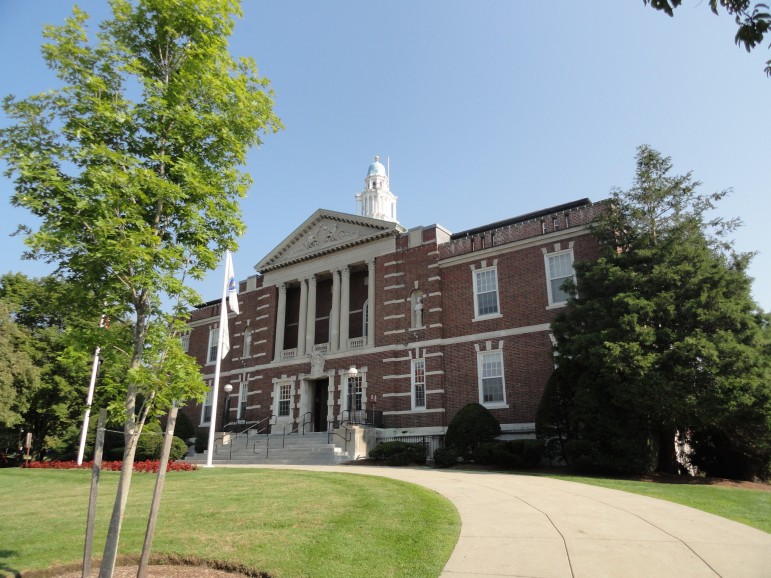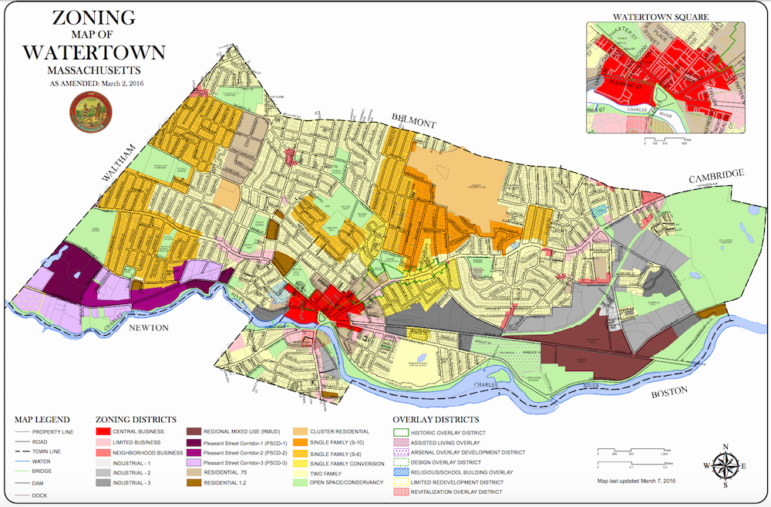
Discussions about how Watertown will meet the state’s requirement to allow multi-family housing in certain areas of town will be included in the City’s planning for improving Watertown Square. Discussions about the Square will begin later this year.
On Tuesday night, The City Council heard an update on the multi-family zoning, which requires communities served by the MTBA to create an area where multi-family housing would be allowed by-right, and therefore would not need special approval from the Planning or Zoning boards if they fall within the city’s zoning requirements.
When the state first released the requirements, they called for Watertown’s multi-family zone to be near the Waverley Commuter Rail station in Belmont. The Council objected, however, because the area would be in the middle of a section of town zoned for single-family homes. Also, they said it would be more useful to have it in Watertown Square where there are more transportation options, as well as stores and businesses to serve residents of the multi-family housing.
In March 2022, the City sent a letter to the MBTA asking to change the location of the multi-family zone. City Manager George Proakis said the latest version of the state regulations has some changes.
“The latest version of the regulations is calling us an adjacent community, allowing us to place this district anywhere within our community where we fit to do so,” Proakis said.
To meet the state’s requirements, Watertown will have to designate at least 24 acres for as-right multi-family zoning with at least 1,701 housing units, said Assistant City Manager Steve Magoon. He added that because they are allowed, doesn’t mean they will all be built, Magoon added.
Watertown must approve the zoning for the multi-family housing by Dec. 31, 2024, Proakis said.
With time to study the issue further, City officials did not have a specific area recommended for the multi-family district on Tuesday night. Magoon said the Planning Department does not want the discussion just to be about the MBTA Zoning, but weave it into the overall direction for the area.
“We want to have a planning process with Watertown Square, and a lot of the things being discussed in the Comprehensive Plan Update to really lead the process,” Magoon said.
The Watertown Square planning will also include what City officials have heard from the public in the Comprehensive Plan Update, which Magoon said will likely be published in mid-February. The new City Manager said he wants to make revitalizing Watertown Square one of his top priorities.
The Council had some questions about how the City would meet the zoning. Councilor Tony Palomba asked whether the project proposed on Main Street with multiple floors of housing on top of retail would be included as part of meeting the requirement. Magoon said he was not sure but added that may not matter.
“The intent of the legislation is that we create a zone where you can create by-right (multi-family housing) of a certain density,” he said. “It doesn’t require that we produce a certain number of units.”

Councilor John Gannon asked how high the buildings would have to meet the requirement. Magoon said it depends on the size of the area designated for multi-family housing.
“It is kind of the proverbial balloon, squeeze it and it pops out in another area,” Magoon said. “If we went with 24 acres it would be pretty high density.”
The first area they would likely look at is the Central Business zone (CB) in Watertown Square, Magoon said, and then look to see if there are other areas where the zone could be enlarged.
On Tuesday, the Council also closed discussion on the reuse of the former Watertown Police Station on Whooley Way in the Committee on Economic Development and Planning. Council President Mark Sideris said the immediate need for more space for municipal workers has been eased with the purchase of the former Parker School on Watertown Street (expected to close on Jan. 17), which is now office space. The future of the site will be part of the discussion of improving Watertown Square, Sideris said.
The way things are going, there will be million-dollar duplexes on every corner of this “multi-family zone”. It’s actually becoming one, big laugh!
America’s cities must develop housing not just for long-time citizens such as seniors.
They must also develop housing for the millions of immigrants who, legally or otherwise, have been crossing America’s southern border in the past several years.
Otherwise, where would these immigrants live?
Do Watertown’s plans include housing for these kinds of immigrants?
I’d like to see some details.